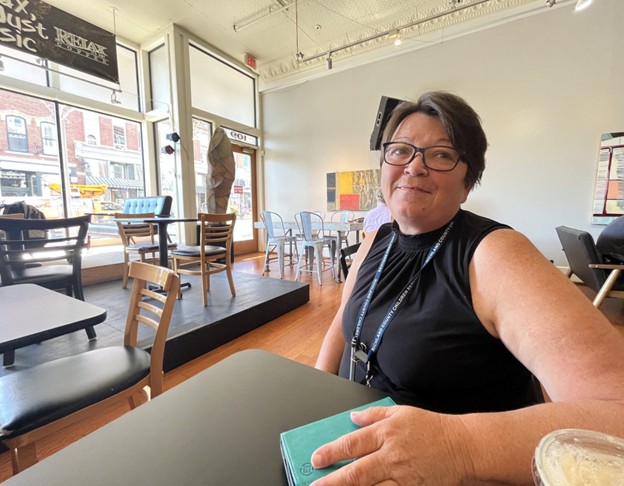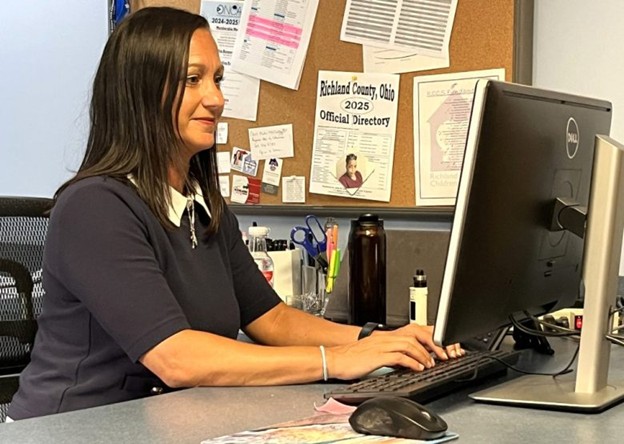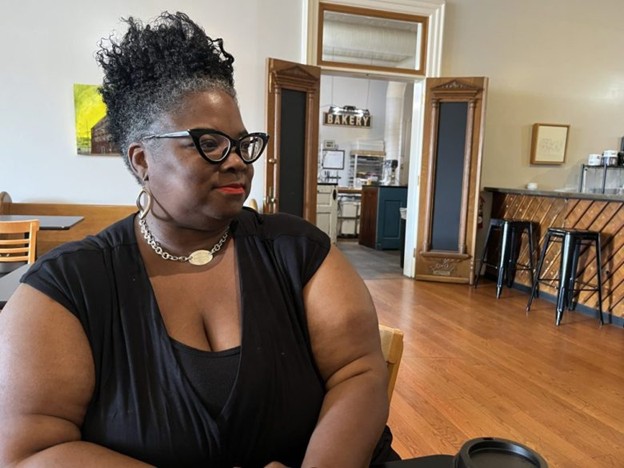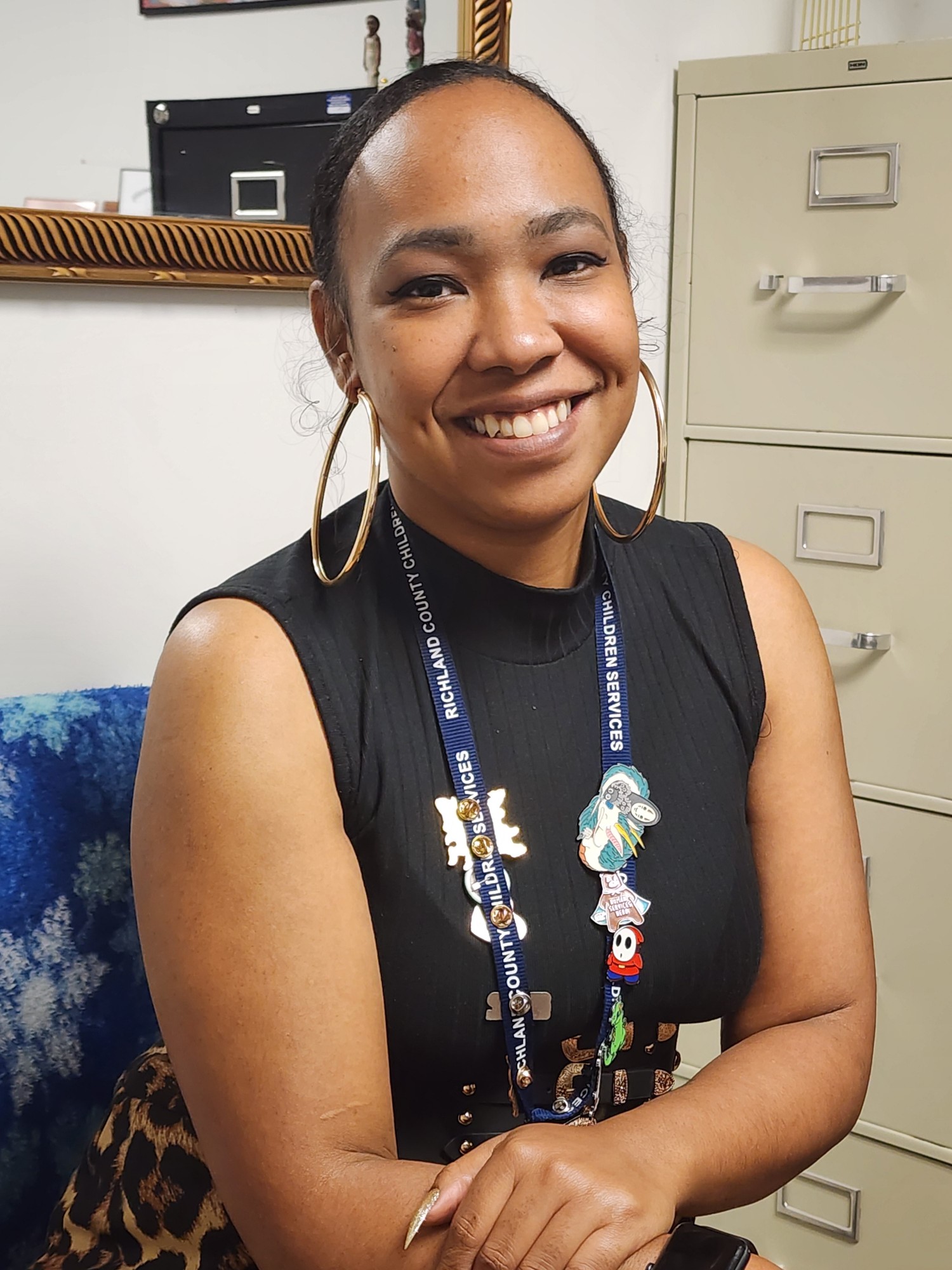Kinship Care: Grandparents, others face same child care challenges as parents
August 13, 2025


Tammy Knudson, a social worker for Richland County Children Services, is also raising five of her grandchildren as a kinship caregiver. Credit: Carl Hunnell
Kinship Care: Grandparents, others face same child care challenges as parents
‘Never once did I dream I was going to be raising my grandchildren,’ says grandmother and social worker Tammy Knudson
by Carl Hunnell August 13, 2025
This story is part of our series on child care in north central Ohio — made possible thanks to the generous support of all our sponsors who believe in the power of local journalism. A special thank you to our Champion Sponsors, North Central State College Foundation and Ashland County Community Foundation, for their leadership and commitment.
MANSFIELD — Tammy Knudson has seen childcare issues from every conceivable angle.
None of it’s easy.
The 51-year-old Knudson became a teenage mom who dropped out of school at age 16. She raised five children, then returned to school and earned a GED and eventually a bachelor’s degree.
Now a social worker at Richland County Children Services, she is raising five of her own grandchildren, faced with the same challenges of the parents and families she assists every day — including the arrangement of child care while she works.
In a society where quality child care is difficult to find and increasingly difficult to afford, the strain can be worse for those who suddenly become primary caregivers again.
None of it’s easy, whether the children are your own — or are perhaps the offspring of your own adult children.
The fact is that on any given day, hundreds of youngsters in Richland County are being raised in formal or informal kinship care — children living in the homes of their grandparents, aunts, uncles, cousins or other adults involved in their lives.
The difference between foster parents and kinship caregivers
Both foster parents and kinship caregivers care for children whose parents cannot do so, but there are key differences between the two.
Kinship care providers are people who have a prior relationship with the child they take in, such as an extended family member, teacher, coach, scout leader or mentor. Kinship caregivers do not have to be trained or licensed by the State of Ohio. They do get a home study done, but it’s not as strenuous as a foster parent home study. Kinship care providers receive less financial assistance from the state to help cover the costs of caring for children.
Licensed foster parents may or may not have a prior relationship with the child in their care. Foster parents must meet a stricter set of requirements in order to be licensed by the state, including training and a home study. They receive more financial assistance from the state, including a monthly stipend.
More than six million children across the country — about one in 12 — live in homes maintained by grandparents or other relatives, according to recent reports from the Annie E. Casey Foundation, a national, philanthropic organization whose stated goal is to build a brighter future for at-risk youth.
More than one-third of that 2.1 million are being cared for without any parents present in their lives.
These kinship caregivers face the same child care challenges faced by “traditional” parents, with two significant exceptions:
- They weren’t counting on parenting at this stage of their lives.
- Their financial planning wasn’t done with an additional round of parenting in mind.

Tara Lautzenhiser, Richland County Children Services Executive Director
“I would say it’s a huge challenge, not just for kinship caregivers,” said Tara Lautzenhiser, executive director at Richland County Children Services.
“I believe any parents raising any children currently, it’s just hard to find openings in daycares or babysitters that you can trust and are able to watch them,” she said.
“I think it’s a huge issue here.”
It’s not just a Richland County issue. It’s national, if not international.
“Grandparents and other relatives often step into this full-time caregiving role unexpectedly. Unlike non-relative foster parents, who have months or years to prepare to take on a child, these kinship families take it often suddenly, sometimes in the span of a night’s notice,” Jaia Peterson Lent, deputy executive director of Generations United, a nonprofit advocacy group, told Stateline.org for a story published in 2024.
“Many of these caregivers may be living on fixed incomes and sacrificing their retirements to meet the needs of their children,” Lent said.
‘Never once did I dream I was going to be raising my grandchildren’
Parenting at her age certainly wasn’t the plan for Knudson, now caring for five grandchildren ranging in age from 2 to 13.
“I probably wouldn’t have believed it,” she said with a laugh when asked if she ever considered being a mom at this age. “I don’t think any grandparent thinks they are going to have to raise a grandchild.
“We think, ‘We raised our kids. We’re going to retire and travel the world and do all things we never got to do as a parent.’ Never once did I dream I was going to be raising my grandchildren,” Knudson said.
Lautzenhiser said few kinship caregivers planned for their new roles, especially how to arrange payment for child care.
“(Child care) is one of their top worries. They are rearranging their lives, providing care for a child again, and also having to find, especially if they are still working, daycare or someone they can pay to watch the children,” she said.
“Sometimes they get lucky and they have other relatives or friends of the family. Depending on the age of the children, we try to help them find after-school programs when caregivers are still working that can help accommodate that gap in time before they get home.
“But it’s a struggle for sure,” Lautzenhiser said.
Knudson readily admits she isn’t doing it alone.
“Some days are harder than others. But, you know, I have my support system. I lean on them a lot, more for mental and emotional support than anything else, especially if I had a bad day and I feel like I am going to cry.
“You don’t realize who your supports are until you need them. I think I have learned who my real friends are since I started raising grandkids,” Knudson said.
Like many kinship care providers, Knudson loves her grandchildren. She willingly took them in when their own parents battled drug addictions they were not able to overcome.
In some cases, she got them as infants, born with drug issues that began even before birth.
She has a hard-earned daily routine.
“Sometimes, I wake up and feel like, ‘Gosh, I can’t do this today.’ Then I just have this voice in my heart saying, ‘Yes, you have got to do this today.’ So I get up at 5 a.m., take a shower, get the kids up at 6 or 6:30, and we’re out the door by 7 a.m.,” she said.
“I found a daycare that will take them and they keep them safe until I can pick them up,” she said.
None of it is easy — or inexpensive. Knudson said sacrifices are a must for parents — and kinship-care providers.
“When I get my tax refund each year, I don’t go on shopping sprees,” she said with a laugh. “I use it to pay my rent up as far as I can, and my car insurance. Those are the two biggest bills in my household,” she said.
Cereal for breakfast is a staple. Chicken nuggets from McDonald’s are an easy supper. It’s not expensive — and the kids will eat them.
“Sometimes, if (finances) are tight, I will stop at my mom’s and we eat dinner there. It’s definitely about budgeting — finances and time,” Knudson said.
As an ongoing caseworker, Knudson said she empathizes for the parents with whom she works.
“But at the same time, you have to look people in the eye and say it’s doable. They need to find their support system,” she said.
Knudson admits Richland County parents are facing increasing difficulty in finding child care.
“I think because of the time constraints. Not everyone can work a first-shift, weekday job,” she said. “I see a lot of parents trying to utilize daycare who have to pick their children up by a certain time.
“Most daycares don’t run second-shift hours. That’s what hurts,” she said, “along with the cost aspect of it.”
The cost of child care in the U.S. is rising at nearly double the pace of overall inflation, according to a new report by tax firm KPMG, reported by ABCnews.com.
Between 1990 and April 2024, the cost of childcare and preschool rose 263 percent, according to KPMG. The consumer price index, the government’s key measure of inflation, has increased 133 percent in the same time frame.
“The child-care crisis, which was simmering prior to the pandemic, has come to a boil,” the report’s researchers said.
Knudson said she works to help families in her cases find ways to make ends meet.
“I know what it’s like when you’re looking at your last couple of dollars until payday and you have got to make good choices. Sometimes telling that child they can’t have something they want because there is a need for something else can be heartbreaking,” Knudson said.
She has also long ago accepted her de facto role as surrogate mom.
“I like to just sit back and laugh at the crazy things we do. I have to remind myself I have to go to work every day and I can’t always be the fun grandma. But I don’t think I would trade it.
“I could be living in a condo right now, but I really don’t think I would be. I love having all of my grandkids at my house on weekends. It’s like a big slumber party. People joke and ask where we find room. I say, ‘What’s one more?’ and they blend right in,” Knudson said.

Rhonda Marsh, Richland County Children Services Kinship Navigator
‘Allow the benefits to follow the child’
Rhonda Marsh is one of two full-time kinship care navigators at Richland County Children Services. A 23-year employee of the agency, she has worked in her current role for the last 13 years.
Marsh and fellow navigator Arlillian Nixon assist those raising grandchildren, nieces and nephews and others. They work with like-minded agencies, non-profits, churches and other organizations to guide kinship caregivers to the help they need.
But it’s also clear Ohio, like many states, is not set up to provide long-term financial help to kinship caregivers as they do licensed foster parents.
Ohio does offer temporary assistance through the Kinship Permanency Incentive program. Those eligible get an initial payment to help with the costs of starting the arrangement.
After that, kinship caregivers might receive more payments every six months to make sure the child stays in a stable home. But the most they can receive is eight payments and the program doesn’t last longer than 48 months in a row.
The KPI payments are extra money in addition to the cash help the child already gets from Ohio Works First.
There are two key words in the above paragraphs: temporary and eligible.
Foster parents will always be paid, unlike kin caregivers. And to be eligible for KPI, the total income of the caregiver’s family should not exceed 300 percent of the federal poverty guidelines.
That’s an annual income of $96,450 for a family of four in 2025.
Marsh is blunt in her assessment that kinship caregivers, who often make too much money to qualify for needed benefits, need the same kind of financial help provided to foster parents, who receive monthly stipends.
According to the Ohio Department of Jobs and Family Services, foster parents receive a daily per diem (paid monthly, which varies by county) to cover the costs of living expenses such as food, diapers, transportation and new clothes.

Richland County Children Services Kinship Navigator Arlillian Nixon
In Ohio, the daily rate is different for each county agency, and additional money is available for special circumstances. The state covers health insurance for foster children − including doctor visits, counseling, therapy and prescription medications — through Medicaid.
Marsh said kinship caregivers deserve similar consideration, at least in terms of financial support.
“Let the benefits follow the child,” she said. “It should have nothing to do with who the caregiver is. Children don’t have an income.
“Just let the benefits follow the child. That will take a load off kinship caregivers.
“It seems to me like there are people sitting at a desk making decisions who never talk to people who do the job out in the community, who really know what is going on.
“Yeah, you can come out in the community. But you are not of the community. You can show up to events. But you are not out there every day maneuvering with these people, hearing their complaints and concerns and worries,” Marsh said.
“It would be wonderful if the (federal and state) government could see benefits need to follow the child and not be based on anyone’s income.”
According to the Annie E. Casey Foundation, just 13 states reported making unlicensed kinship caregivers eligible for foster care maintenance payments.
Marsh said kinship care providers are not doing it for money.
“They are really in it because they love that child and they want to see them thrive in their life. It has been proven statistically that it is better for a child to live with someone that they know … someone they are familiar with … that they thrive there better than they do in foster care,” Marsh said.
The child care woes make it even more difficult, she said.
“Kinship care providers are furious about it. A lot of the time, they can’t work anymore. They have to quit their jobs, especially if it’s a baby. Daycare is so expensive,” Marsh said.
The reverse can also be true.
“I have a case now with a great-aunt. She is taking care of three children. She was retired. She can’t take care of them on her retirement income, so she is going to go back to work.
“How is she going to afford child care?”
« Back to News
